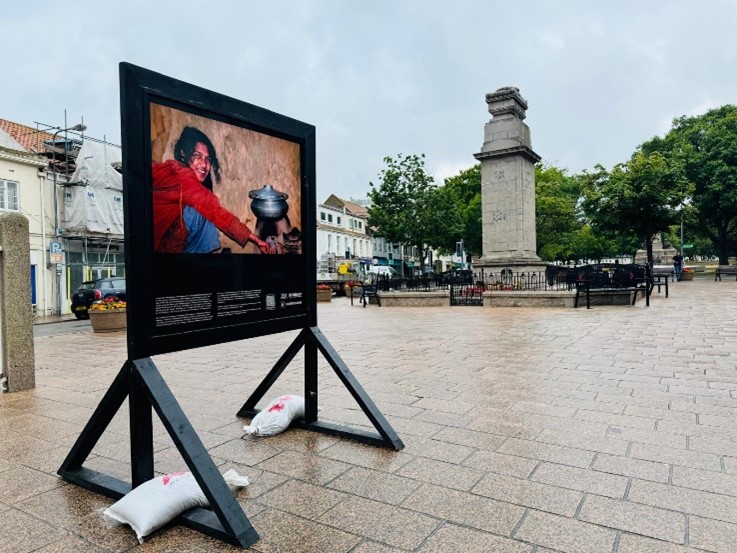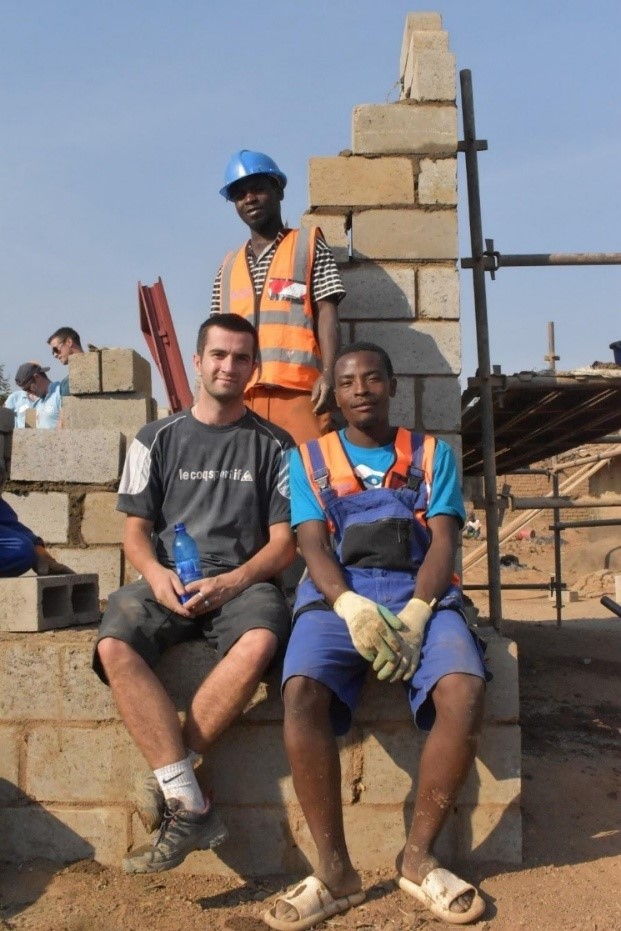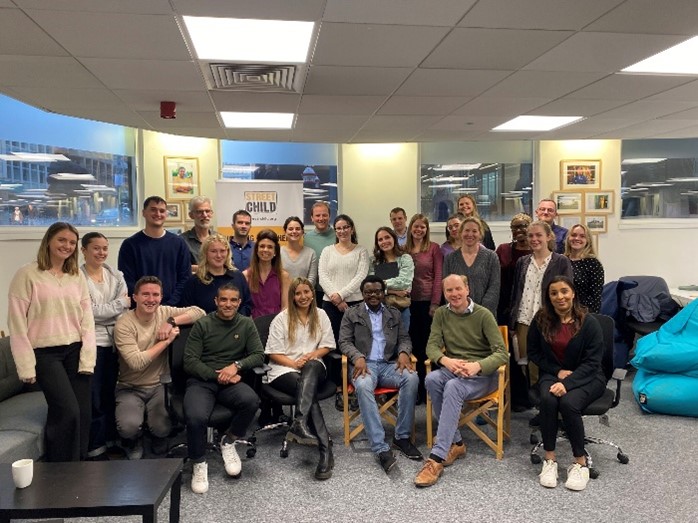Name: Richard Crane
Age: 24
Occupation: Programme Associate at JOA
Role Model: Johannes van der Klaauw, former UNHCR Representative in Bangladesh
Office Snack of Choice: Sausage roll
Ambition: To champion public-private partnerships in international development.
Why is the Programme Associate role so unique?
This is more than just a job — it’s a tailor-made training programme designed by the JOA team to give Jersey residents a rare and immersive introduction to international development. Over 18 months, I will experience the sector from three key angles and perspectives.
I began in Jersey, working with JOA – Jersey’s publicly funded international development agency – which does far more than grant-making. JOA supports local charities, educates the public, and plays a leading role as a global advisor in humanitarian aid. I am now in London, working for Street Child, one of the fastest-growing international children’s education charities, working hands-on in fundraising for their international programmes. For my final six months, I will be joining Street Child Nepal, a local NGO team in-country, supporting programme delivery and strengthening on-the-ground management.
For graduates and Jersey residents aspiring to enter the field of international development, the journey is often filled with challenges. Many entry-level positions are unpaid, require a master’s degree, three years of experience, and specific field expertise. What the JOA Associate role offers is a wealth of hands-on experience and training—whilst being financially supported—giving you the springboard (not to jinx it!) to move beyond entry-level roles and secure frontline positions within the development sector. But it’s more than just professional development – it’s been a journey of personal growth and a deepened sense of purpose.
For this incredible opportunity, I will forever be grateful to JOA.
My Role In JOA

In the first six months of my placement, I immersed myself in everything from grant management to global travel. I worked closely with the Communications team to help raise public awareness while also championing the rights of the most vulnerable. One highlight was supporting the Rohingya exhibition, a powerful island-wide storytelling initiative that gave a voice to residents of the world’s largest refugee camp—and was a real joy to help manage. Alongside this, I completed training in project management and inclusive finance, key learning experiences that have already proved valuable.
My core focus, however, has been in the Programmes team, particularly within the Financial Inclusion portfolio. I’ve contributed to evaluating and selecting new projects for funding and have supported ongoing due diligence checks on grantees and their partners. I also played a role in developing impact-focused lines of inquiry for an in-country monitoring visit.
It’s been a steep learning curve, both professionally and personally. But what I’ve loved most is the chance to engage with such a wide range of people—from UNHCR representatives and Jersey-based charity leaders to local Islanders, whether over a pint at the pub or in a boardroom they have all offered fresh and valuable perspectives.
One standout moment? Assisting a volunteering project in Malawi, where I helped lead a group of Jersey residents on a house-building mission I’ll never forget.
A Week with Habitat for Humanity: Lessons Beyond the Build
One of the standout moments of my time with JOA so far has been taking part in the 2024 volunteering project in Lilongwe, Malawi, in partnership with Habitat for Humanity. Over the course of a week, I joined 13 other Jersey residents to support the Home Equals programme, which is working to improve living conditions for 6,200 people in the Magombo informal settlement.
In just six days, our team of Jersey volunteers and skilled Malawian artisans built two homes for two vulnerable families in the village: Gladys Bauleni and Manesi Letala, who are senior caregivers supporting multi-generational families and had been living in overcrowded, unhygienic conditions. I surprised myself with how quickly you can build a house when Jersey planning laws aren’t involved!
What struck me most was how this experience shifted my perspective in a way no classroom or office-based learning could. Speaking with Gladys, Manesi and their families, community leaders, and the team at Habitat for Humanity offered an unfiltered view of daily life and real needs, insights that can sometimes be lost when designing programmes from afar. It was incredible to see how much you can learn and gain personally, while also making a life-changing impact for the beneficiaries, all in just a week!
What is Street Child?
Trading the calm of St. Helier’s parish hall for the energy of central London has been quite the shift! Nothing really prepares you for swapping sea breezes and intimate JEP headlines for the daily hum of sirens and the never-ending Pret queue.
Let me introduce you to Street Child - one of the fastest-growing international children’s charities, committed to ensuring the world’s most marginalised children are safe, in school, and learning. Operating in over 20 countries, including Afghanistan, Ukraine, Nepal, and Nigeria, Street Child works in both emergency and chronically under-resourced settings. Since its founding in Sierra Leone in 2008, the organisation has transformed education opportunities for more than 1.4 million children globally.
Local leadership is at the heart of their approach: working with over 200 local partners to deliver projects that are context-specific and grounded in deep community trust.
My Role at Street Child
At Street Child, I’ve been part of the Global Programme Fundraising team. While the name might conjure images of shaking bright orange buckets on Oxford Street, the reality is a bit more strategic! My focus has been on crafting compelling funding proposals for a diverse portfolio of donors, from family foundations to major institutional funders (including JOA!). It’s challenging and deeply rewarding work, helping unlock vital resources for our programmes.
More recently, I’ve worked closely with Street Child’s team in the Democratic Republic of Congo (DRC), supporting fundraising for an emergency child protection programme called Endeleya, which means “Don’t Give Up” in Swahili. The programme was launched in response to the severe humanitarian crisis caused by renewed conflict between M23 rebel forces and the Congolese army.
The children we aim to support through Endeleya have experienced profound psychological distress, having faced violence, recruitment by armed groups, displacement, family separation, and in many cases, sexual violence. In response, Street Child is establishing child-friendly spaces where trained social workers and volunteers provide mental health support, structured play and learning, and referrals to professional services, creating safe, stabilising environments for recovery. The programme also includes family tracing and reunification for children separated from their caregivers.
As part of my role, I’ve been helping shape our fundraising outreach campaign, reconnecting with past emergency donors and engaging new potential supporters. It’s been a fast-paced and hands-on experience.
Funding Challenges in the Sector
You might assume that securing funding for such vital work would be straightforward, but since joining Street Child, I’ve seen firsthand just how challenging and competitive the funding landscape has become. Budget cuts by USAID and the UK FCDO are having serious consequences for NGOs’ ability to respond to crises.
Trusts and foundations, traditionally a backbone for medium-sized charities, are also under pressure. The surge in applications has intensified competition, forcing some to stop accepting unsolicited proposals altogether. It’s a tough landscape, especially for smaller organisations. Every funding proposal I write now needs to be laser-focused and carefully tailored to each donor’s priorities.
This aspect of my placement has equipped me with new skills and deepened my commitment to helping NGOs access sustainable funding.
Looking Ahead: Nepal, Here I Come!
I’m thrilled to share that on the 1st of May, I’ll be heading to Street Child Nepal! This country has been a key focus for Street Child, especially since the devastating 2015 earthquakes and the ongoing effects of COVID-19. Education in Nepal took a huge hit during the pandemic – 8.3 million school-age children experienced substantial learning loss, and the average learning loss in Nepal is equivalent to 3 years of schooling, the highest globally.
Street Child Nepal will soon be launching an exciting new STEM programme to inspire the next generation of innovators and problem-solvers by establishing STEM clubs in schools and connecting girls with mentorship opportunities. With only 0.5% of women employed in STEM industries in Nepal, this initiative is much needed.
It will be an incredible opportunity to be involved in the programme’s implementation from day one—seeing how a new project takes shape and begins to create real impact on the ground.
And, of course, I’ve heard Nepal has a few decent hills to climb, so I’ll definitely be packing my hiking boots too! I look forward to sharing more updates as my journey continues.



